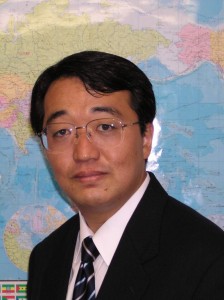緊張と統合:内村鑑三におけるキリスト教と日本の精神
このシリーズでは、私が1994年に執筆した統一神学大学院(Unification Theological Seminary)の神学課程修士論文(Divinity Thesis)を日英二か国語で掲載している。
4.無教会運動における司牧の概念の続き
一方、無教会は何か特定の教会から分離したものではなく、日本人にとって無意味な外国の上部構造から自由な土着のキリスト教を創り出そうという努力によって生まれたものである。したがってある意味において無教会は西洋型の教会に対するアンチテーゼであり、キリスト教をその西洋的な衣から解放しようとする試みである。しかし、それは単にキリスト教の中の異国的要素に反対した、否定的な現象ではなかった。内村は「文化のキリスト」の範疇にはおさまらない。彼にとってキリスト教は、特定の歴史的実在に依存しない超越的・普遍的宗教であったために、それが組織的な教会の枠内に納まることは有り得なかったのである。
B.職業的牧師に対する無教会の見解
トーマス・C・オデンは一般的に支持されている牧師の概念を、「神と教会によって召命され、代表して御言葉を宣布し、聖礼典を執り行い、キリスト者の共同体を神の自己開示に対して全面的に答えるように導き、そして養うために、叙階によって聖別されたキリストの体の一員である」と定義している。内村はこの様な教会における職業的牧師の概念を、まっこうから否定する。士族の出身である内村は、幼い頃から祭司階級を軽蔑するように訓練されていた。彼は札幌農学校を卒業したときの日記に次のように記している:
ナザレのイエスにおいて我々は、大工の子であることによって人類の救拯主であった人を見たのである、そして我々彼の賤しき弟子達は農夫、漁夫、技術者、製造者であって同時に平和の福音の伝道者であるかもしれなかった。漁夫ペテロと天幕製造者パウロとが我々の模範であった。我々はけっして基督教をいかなる種類の聖職制度とも教会主義とも解釈したことはなかった。我々はそれを本質的には平民の宗教として受取る、そして我々が『この世の人』であることは我々が伝道者であり宣教師であることにすこしも障害とはならない。我々は信ずる、我々の科学カレッヂを去った時の我々以上に潔められた一組の青年がかつて学園を去ったことはなかったと。我々の目的は精神的であった、我々の訓練と到達点とは物質的であったけれども。(岩波、前掲書、p.71)
内村の西欧キリスト教に対する理解そのものは、彼がハートフォード神学校において神学を学ぶ間により深められ、また挑戦を受けた。彼が神学校へ進んだのはもともと自分のためであって、牧師になるためではなかったが、彼はすぐに神学的勉強の性質に対して不満を抱くようになった。彼は宗教を実体的で科学的に理解できるものと考えていたが、西洋の神学が非現実的、非実際的で、「凡ての学問の中にて最も乾燥無味にして最も無価値なもの」であり、ただたくさんの混乱せる「主義」に導くものであることを発見したのである。
内村に多大なるショックを与えたのは神学生の態度であり、それはキリスト教神学の道徳的破綻を物語っていた。学生達は神学上の重大な問題よりも、牧師となることによって期待できる収入に対してより大きな関心を示していたのである。内村は「説教が豚肉やトマトや南瓜の有するが如き市場価値を有するとうことは、少なくとも東洋人的観念ではない」と批判した。慢性不眠証とホーム・シックに苦しみ、ひどい憂欝症になった内村は、神学校をやめて日本に帰る決意をしたのである。
III. Concept of Ministry in Mukyokai Movement (Cont.)
The Mukyokai, in contrast, were not the offspring of a specific church but resulted from the effort to create an indigenous Christianity free of and foreign superstructure meaningless to Japanese life.(10)Thus, in a sense, Non-church was the antithesis of the western type of church, an attempt to free Christianity from its Western garment; however, it was not just a negative phenomenon in opposition to the foreign elements of Christianity. Uchimura does not fall into the category of Christ in culture group. For him Christianity could not be confined to the limits of institutional church because Christianity was a transcendent or universal religion, independent of particular historical realities.(11)
B. The Mukyokai View of Professional Ministry
Thomas C. Oden defines the commonly believed conception of the pastor as “a member of the body of Christ who is called by God and the church and set apart by ordination representatively to proclaim the Word, to administer the sacraments, and to guide and nurture the Christian community toward full response to God’s self-disclosure.”(12)Uchimura definitely rejects this notion of professional minister in the church. As a member of a warrior family, Uchimura was trained to despise the priestly class from early childhood. He noted in his diary when he graduated the Sapporo Agricultural College as follows:
In Jesus of Nazareth we saw a man who was the Savior of mankind by being the son of a carpenter, and we his lowly disciples might be farmers, fishermen, engineers, manufacturers, and be at the same time preachers of the gospel of peace. Peter a fisherman and Paul a tent-maker were our examples. We never have construed Christianity as a hierarchy or ecclesiaticalism of any sort. We take it essentially as people’s religion, and our being “men of the world” are of no obstacles whatever for our being preachers and missionaries. We believe, no more consecrated set of young men ever left a hall of learning than we when left our science college. Our aim was spiritual, though our training and destination were material.(13)
Uchimura’s understanding of western Christianity itself was deepened and challenged during his studies of theology at Hartford Seminary. Originally, he had enrolled for his own personal benefit rather than as a path to ministry, but he soon grew dissatisfied with the nature of theological training. While he conceived of religion as tangible and scientifically comprehensive, he found western theology to be unrealistic and impractical, the “driest and most worthless of all studies,” leading only to a multitude of confusing “isms.”
The behavior of the seminarians, which shocked Uchimura greatly, illustrated the moral bankruptcy of Christian theology. The students were more concerned about the income to be expected from the ministry than about serious theological questions. “That sermons have market value, just like pork, tomatoes, and pumpkins,” Uchimura commented, “is not an Oriental ideal, at least.” Deeply depressed and suffering from chronic insomnia and homesickness, Uchimura decided to leave the seminary and return to Japan.(14)
(10)Raymond P. Jennings, Jesus, Japan, and Kanzo Uchimura, p.65.
(11)Robert Lee, “Service to Christ and Country: Uchimura’s search for meaning” in the Japan Christian Quarterly, vol. 54, No.2, (Spring 1988), p.106.
(12)Thomas C. Oden, Pastoral Theology. (New York: HarperCollins Publishers, 1983), p.50.
(13)Uchimura, How I became a Christian,”.p.71.
(14)Caldarola, p.45.
